mySMARTLife in Barcelona: Smart City Expo World Congress 2019
| Read More |
Newsletter #6 |
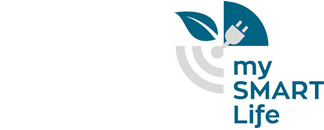 |
|||
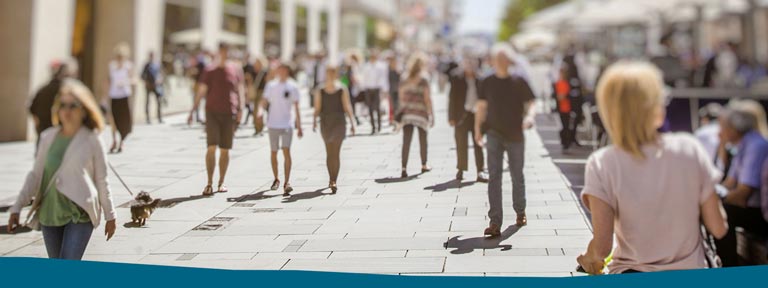 |
||||
mySMARTLife – Editorial |
||||
|
"Driving home for Christmas" – it is the time of the year where we can listen to Chris Rea’s classic almost everywhere. But until we reach the point where we can really drive home for Christmas and enjoy the holidays with our families and friends, there's a lot to do. Or do you have got all the presents together yet? |
For this reason, we would like to take a closer look at our mySMARTLife interventions that focus on homes, to be precise on Smart Buildings and Homes, in our three Lighthouse Cities Helsinki, Nantes, and Hamburg. Therefore, we will take a closer look on Helsinki’s smart heating control, Nantes Metropole’s new support strategy for retrofitting as well as Hamburg’s smart home assistant living. Wishing you a good and inspiring read. And of course, the whole mySMARTLife team wishes you a merry Christmas and a happy new year! Rubén García Pajares |
|||
mySMARTLife – Focus Topic
|
||||
|
A structure with a roof and walls: this is the minimal definition of a building. But to turn a building into a smart building, the central building services system must be networked and digitized. Then again, in a smart home, individual household appliances and room controls are networked. As part of mySMARTLife, both methods are being implemented. So let’s explore them in more detail. |
||||
Helsinki’s Smart Heating Control |
||||||||
|
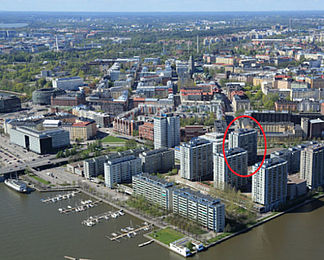
Merihaka, Haapaniemenkatu 12 encircled (photo: Helsingin Merihaka Oy)
|
|||||||
|
In spring 2017, the housing association of Haapaniemenkatu 12, where the intervention has taken place, decided in their annual general meeting to install smart thermostats in the whole building. Subsequently, the installation was done in two phases; first a set of 20 apartments in the end of 2017 to get proper feedback of the installations and user experiences of the solution. Then, based on those results, the installations were done to the rest of the building in spring 2018. The installation of these smart thermostats can reduce energy consumption in two ways: The thermostats have built-in intelligence; hence, the installation itself in most cases reduces energy consumption. The most efficient way is when the end-users install the service application on their smart device and dynamically control the heating, for example lower the temperature during absence as in working hours or during vacations. For the residents to use the smart thermostats in a way that would bring the most efficient results, they need to have an internet connection and a smart device to use the application for dynamic heating. |
||||
 |
||||
From reconstruction to monitoring:
|
||||||||
|
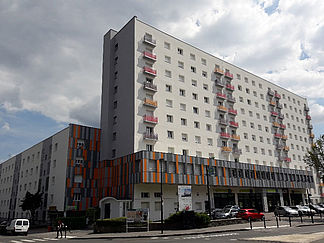
Retrofitting works in Nates (photo: Solécité, Scop d'architecture, Laurent Raimbault & associés)
|
|||||||
|
Regarding condominiums, mySMARTLife also contributes to the energy transition objectives with the implementation of high-level energy retrofitting of five multi-owner buildings, representing over 18,000m2 and 270 dwellings with an energy target below 80 kwh/m2 gross area. The energy retrofitting works have just been finalized and included the insulation of roofs, facades and low floors, the replacement of windows, the ventilation system, and -for two of the buildings- the integration of RES (thermal solar panels and connection to the district heating). Since the conversion works have been completed, the monitoring phase will start soon. It will involve the analyses of energy consumptions related to heating, domestic hot water production and ventilation and will also include measures on air quality and indoor comfort (e.g. CO2, temperature in the various rooms). These consumptions will then be compared with meteorological data. Moreover, a field survey will be conducted among inhabitants. Finally, a thermal camera will reveal any implementation anomalies or existing thermal bridges. |
||||
 |
||||
Hamburg: Smart Home Assistant Living |
||||||||
|
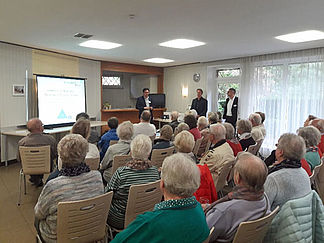
Information event at a local community centre of the housing cooperation and different sensors of the smart home system (photo: Borough of Bergedorf)
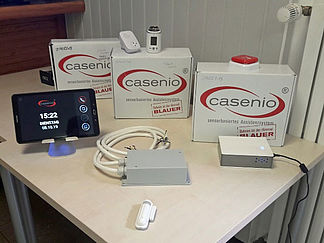
Information event at a local community centre of the housing cooperation and different sensors of the smart home system (photo: Borough of Bergedorf)
|
|||||||
|
This, for example, should prevent the stove being left on unattended. The goal is to enable the elderly people to stay in their apartments and familiar environment as long as possible, which is also helpful for the relatives. This should be achieved in the combination of the smart home system and the services offered by caretakers, so called “household helpers”. These can be contacted and booked via the smart home system. The implementation of the action is still ongoing. Altogether three information events for tenants were accomplished. These showed that there is a high interest in the solutions among the elderly people and their relatives. The implementation of the first 20 systems will start in in January 2020. |
||||
 |
||||
News from the three Lighthouse Cities Nantes, Hamburg, Helsinki
|
||||
|
The City of Nantes was named European Capital of Innovation 2019 during the European Research and Innovation days in Brussels on 25 September 2019. The award was given to the capital of France’s Loire-Atlantique department due to its outstanding ability to harness innovation to improve the lives of its citizens and its open and collaborative governance model and comes with a monetary prize of €1 million provided by the Horizon 2020 European programme for research and innovation.
How can we make last mile deliveries in cities as ecologically as possible? That was the core question of mySMARTLife’s FLUX Call for Projects on Urban Logistics, launched by Nantes Metropole and 14 partners in Nantes’ metropolitan area in 2018. Find out what has happened since the winners of the call were announced in June 2019. |
||||
 |
||||
Hamburg: |
||||
|
Hamburg University of Applied Sciences (HAW Hamburg) did publish an interview with Simon Decher, researcher at the Competence Center for Renewable Energies and Energy Efficiency (CC4E), who is responsible for our EU-funded project. On July 4, the HafenCity University Hamburg organised in cooperation with the European University Flensburg a workshop focusing on "Smart City and Digital Transformation in Hamburg". The workshop was carried out by the Department of Urban Planning and Regional Development of the HCU and brought together scientists from the fields of urban planning and geography to discuss various aspects of digital transformation in cities. |
||||
 |
||||
Helsinki: |
||||
|
At the end of November, SCIS released an interview with Marja Vuorinen, former lead of Lighthouse City Helsinki, about the objectives of mySMARTLife and what actions Finland’s capital is taking The City of Oulu, fresh Lighthouse City of the Making-CITY project, hosted a gathering of Finnish Lighthouse project cities from 19-20 August 2019. All of the Lighthouse and Fellow Cities from Finland were present: Vaasa (Iris), Tampere (Stardust), Kerava (MatchUp) and our LHC Helsinki. On 12 June, the Finnish capital did celebrate its birthday – and of course, mySMARTLife could not miss this joyful occasion. For this purpose, everyone interested in automated vehicles was invited to enjoy a ride into the future in Kalasatama district. There, a robot bus, operated by Helsinki RobobusLine, ran nonstop between 9 a.m. – 3 p.m. At the end of the day, 152 people did join the ride. |
||||
 |
||||
mySMARTLife – Project News |
||||||
 |
|||||
mySMARTLife – Events |
|||||
|
SAVE-THE-DATE: Replication Workshop during Tampere Smart City Week
|
|||||
|
Project Meeting in LHC Hamburg
|
|||||
|
SAVE-THE-DATE: Policy Conference of EU Sustainable Energy Week (EUSEW) 2020
|
|||||
|
|||||
 |
News from our Sister Projects |
||||
|
mySMARTLife is one of seventeen European Smart Cities and Communities Lighthouse projects, currently receiving funding within the European Union’s Horizon 2020 Research and Innovation programme. We are getting more and more: Welcome to SPARCS, POCITYF, and ATELIER! We would like to introduce to you three new smart city projects that have been launched in autumn 2019. |
SmartEnCity invites you to participate in their 2020 online training course "The SmartEnCity Academy for Zero Carbon Transition: Online Training Course for Cities and Smart Decision Making". Join our sister project on a series of four online training courses to learn from the experiences of the SmartEnCity project partners and cities as well as selected external professionals. |
|||
 |
About mySMARTLife |
||||||||
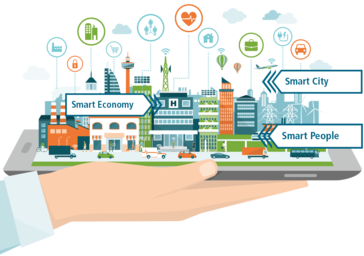
Hand holding a digital tablet with a contemporary smart city and apps icons (picture: Shutterstock.com, elenabsl)
|
|
|||||||
 |
||||||||
|
Picture Sources: Crowd of anonymous people walking on busy city street: Shutterstock.com, BABAROGA | Merihaka, Haapaniemenkatu 12 encircled: Helsingin Merihaka Oy | iCapital 2019 award ceremony in Brussels: European Commission | Simon Decher: CC4E| On the way to the demo site – using the mode of transport preferred by the locals: Maria Viitanen | Hand holding a digital tablet with a contemporary smart city and apps icons: Shutterstock.com, elenabsl |
||||
 |
|||||
|
Project Coordinator: Rubén García Pajares, CARTIF Technology Centre |
|||||
|
Editorial: Kathrin Eckerlin, Steinbeis Europa Zentrum |
|||||
| www.mysmartlife.eu | |||||
 |
 |
 |
 |
 |
 |
 |
||||||||
 |
 |
 |
 |
 |
 |
 |
||||||||
 |
 |
 |
 |
 |
 |
 |
||||||||
 |
 |
 |
 |
 |
 |
|||||||||
 |
This project has received funding from the European Union’s Horizon 2020 research and innovation programme under grant agreement No 731297.
|
||||
| If you do not wish to receive any more information about mySMARTLife activities, you can unsubscribe from our newsletter here. | |||||
 |
|||||
| |
 |
Contact | Imprint | |||||||